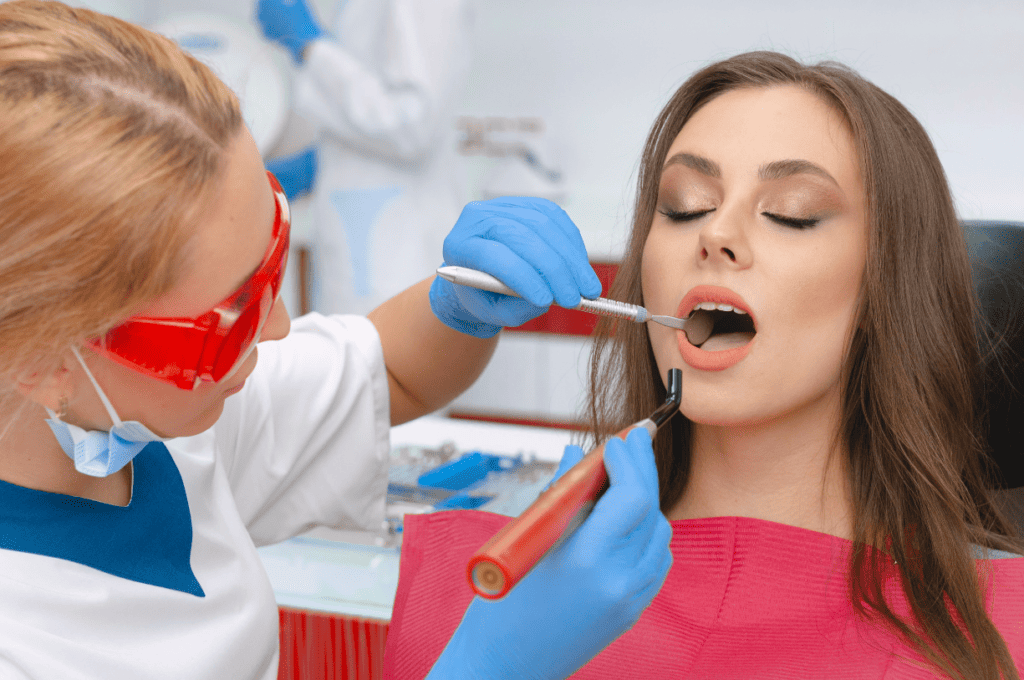Prosthodontics stands as a vital specialty within dentistry, focusing on the restoration and replacement of teeth to enhance oral function and aesthetics.
This branch of dental care or dental restoration is dedicated to helping individuals regain the ability to chew, speak, and smile with confidence, addressing issues stemming from lost or damaged teeth due to various causes such as decay, injury, or disease.
The Scope of Prosthodontic Care
Prosthodontic treatments encompass a broad spectrum of procedures tailored to replace missing teeth and restore damaged ones. This includes the fabrication and fitting of fixed bridges, removable dentures, crowns, and the increasingly popular dental implants. Each of these solutions plays a specific role in oral rehabilitation, contributing to the restoration of patient’s dental health and functionality.
Prosthodontists, the dentists who specialize in this field, are not just tooth replacement experts; they are also skilled in treating facial anomalies and aesthetic concerns related to the mouth, jaw, and facial structures. Their expertise extends to the management of snoring and sleep disorders, temporomandibular joint (TMJ) syndrome, and reconstructive dentistry following oral cancer treatment.

Importance of Prosthodontic Treatment
The impact of prosthodontic care is profound, affecting aspects of physical health, aesthetics, and patient psychology. Missing or defective teeth can lead to poor nutrition, speech impediments, and social discomfort.
By restoring dental structure, prosthodontists enhance patients’ health, appearance, and self-esteem. They ensure that replacements not only fit well but also blend seamlessly with the surrounding teeth, providing a natural appearance.
Furthermore, prosthodontic treatment aids in the preservation of oral structures, preventing the shift of remaining teeth and the degradation of jawbone that often follows tooth loss. By maintaining proper oral structure and function, these interventions help avert further dental problems and contribute to overall well-being.
Comprehensive Care Approach
A commitment to personalized, comprehensive patient care marks the field of prosthodontics. Prosthodontists conduct thorough evaluations, considering various factors such as facial aesthetics, dental function, and individual patient needs. They develop customized treatment plans that address both functional needs and cosmetic preferences, ensuring outcomes that patients can feel good about.
In addition to direct patient care, prosthodontists often lead a dental team, coordinating with other specialists to provide holistic treatment. They play a critical role in treatment planning, particularly for complex cases requiring multifaceted dental procedures.
Evolving Practices and Technologies
Prosthodontics is a dynamic field, continually evolving with advances in materials science and digital technologies. Modern developments, such as CAD/CAM (computer-aided design and computer-aided manufacturing) and 3D printing, have revolutionized the way dental prostheses are designed and fabricated, enhancing precision and patient outcomes.
Prosthodontists stay at the forefront of these advancements, incorporating the latest techniques and materials to provide state-of-the-art care. For cutting-edge prosthodontic treatments, visit Seattle Specialty Dentistry.
Exploring the Types of Dental Prostheses in Prosthodontics
Prosthodontics offers a variety of dental prostheses designed to address different needs. From replacing a single tooth to providing solutions for complete tooth loss, the field encompasses several types of restorations, each with unique characteristics and applications.
Dentures: Complete and Partial Solutions
Dentures are one of the most traditional forms of dental prostheses, offering solutions for patients with partial or complete tooth loss. Complete dentures replace all teeth in an arch, while partial dentures fill in gaps left by several missing teeth, anchored to existing teeth with clasps or precision attachments. Modern advancements have improved the comfort, fit, and appearance of dentures, making them a more appealing option for many patients.
Dental Bridges: Bridging the Gap
Dental bridges are used to replace one or more missing teeth by anchoring artificial teeth (pontics) to adjacent natural teeth or implants, known as abutments. Bridges not only restore the aesthetics and function of the teeth but also prevent the shifting of remaining teeth into the empty spaces, maintaining proper bite alignment and facial structure.
Dental Crowns: Restoring Individual Teeth
When a tooth is damaged but not lost, a dental crown can be used to restore its shape, size, strength, and appearance. Crowns, often referred to as “caps,” cover the entire visible portion of a tooth above the gum line and can be made from various materials, including porcelain, ceramic, metal, or composite resin, depending on the patient’s needs and aesthetic preferences.
Dental Implants: A Foundation for Replacement Teeth
Dental implants represent a significant advancement in prosthodontics, providing a stable and durable foundation for replacement teeth. Implants consist of titanium posts surgically placed into the jawbone, onto which crowns, bridges, or dentures can be securely attached. Unlike other prostheses, implants stimulate the jawbone, helping to prevent bone loss and maintain facial structure.
Choosing the Right Prosthesis
The selection of the most appropriate dental prosthesis depends on several factors, including the number of missing teeth, the condition of the remaining teeth and jawbone, the patient’s overall health, and their aesthetic and functional needs. A prosthodontist will conduct a thorough evaluation and discuss the best options based on the patient’s unique situation.

Dental Restoration: Enhancing Lives with Prosthodontic Solutions
Prosthodontics plays a crucial role in dental medicine by offering advanced solutions for restoring and replacing teeth, thereby enhancing patients’ oral health, function, and aesthetics. Understanding the various types of dental prostheses and their applications allows individuals to make informed decisions regarding their dental care.
Collaborating with a skilled prosthodontist ensures personalized treatment plans tailored to meet each patient’s unique needs. Embracing prosthodontic treatments opens the door to not only improved dental health but also a renewed sense of confidence and well-being.


